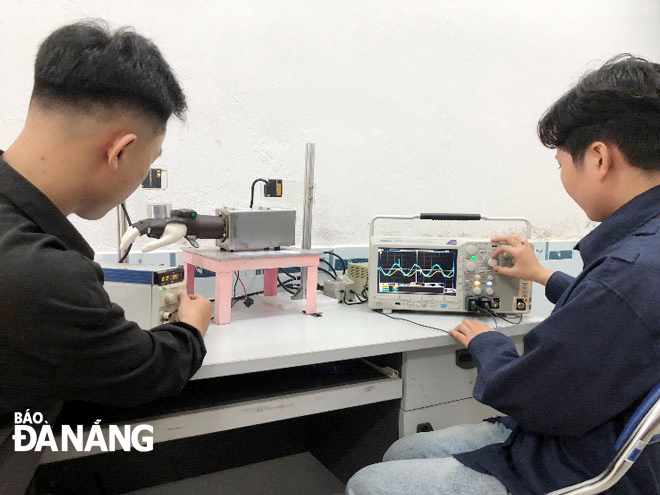Research targets medical care solutions
According to experts, many scientific research projects of students of the Da Nang University of Technology and Education are quite new and humane when focusing on a group of medical support solutions for the disabled, those with weak health with underlying diseases.
 |
| The group of students creating a device that assists people with hand tremors will perfect the features of the product with the goal of selling it to customers in the future. Photo: H.L |
Enhancing quality of life
With high applicability, a device assisting people with hand tremors, created by a group of students of the Faculty of Mechanical Engineering, surpassed 1,231 research projects nationwide to win the second prize at the Euréka National Scientific Research Student Award 2022.
Student Bach Ngoc Bich Dao, a student from the Faculty of Mechanical Engineering, a member of the research team, said that the device uses the gyroscope moment of inertia, operating on the principle of torques. The rotating discs located inside the gyroscope absorb the disturbance force, helping to reduce hand tremors for patients with Parkinson's disease.
Accompanying Dao throughout the process of researching and perfecting products, student Vo Van Hoang said that the group had previously visited a number of hospitals and medical centres to observe the symptoms of Parkinson's disease. “Patients with this disease often cannot control their muscle movements; their limbs are stiff; their movements are slow; they have difficulties in walking; so we are determined to find solutions to help reduce tremors. So as to evaluate the efficiency, the team used two 3-7Hz oscilloscope sensors, analyzed on a sine meter. When testing the product on two patients, their hand tremors decreased by 70%, being able to hold small objects such as phones and pens,”, said Hoang.
Sharing the same goal of supporting medical solutions for the elderly, people with reduced mobility, a smart, light, compact toilet with health monitoring features, created by a group of students majoring in engineering technology - automation control and information technology also received positive feedback.
Vu Tuan Anh, the Deputy General Director of Dr.SME Digital Transformation and Restructuring Consulting Company, assessed this as a humane project, helping to improve the quality of life for patients and elderly people who have lost mobility.
The finishing process can integrate more sensors and hardware to increase product features such as the ability to analyze health data and give warnings to family members. With plastic materials and easy-to-find tools, the product can be manufactured domestically, even in Da Nang.
Tran Van Phuc, a student of engineering technology - automation control, a member of the research team said that the product is integrated with smart solutions such as heart rate sensor, blood oxygen index in the lid area, and temperature. The bottom of the tank is arranged with a plastic bag that is easy to decompose, and the UV lamp installed in the lid of the tank has the effect of killing bacteria and reducing odors.
The infrared sensor turns on the UV light when the toilet lid is closed and turns off when the lid is opened. Health and hygiene indicators are transmitted to the phone via the free Blynk app. In addition, healthy people can also measure health indicators through the product.
Portable toilet products weigh about 1kg, making it easy for movement and installation. The team will strive to create special bed models for bed-ridden patients with polio.
Encourage students to research more
Previously, the project ‘The application of Kinect sensors to serve the process of prototyping hands and prosthetics for people with disabilities’ by a group of students in class 18CDT1 from the Faculty of Mechanical Engineering also won the first prize in the Da Nang Science Research Contest for Students in 2021.
The research team used Kinect image sensor technology to scan amputated parts, then process the images, design the prosthetic socket for the amputees using PLA plastic, based on the 3D printing technology. This processing step helps to digitise the entire size and shape of the disabled limb, creating a prosthetic arm and leg that fits each person. In addition to the scientific value, the topic is evaluated as humane when it can help disadvantaged groups to enhance mobility and improve quality of life.
Assoc. Prof. Dr. Phan Cao Tho, the Rector of the University of Technology Education, said that the school always encourages students to do research into products in support for community health care. For highly applicable products, the school is ready to act as a bridge helping students find consumption markets for products or access technology solutions for further development and replication.
“The school has spent funding on promoting scientific research activities among students and considers it a criterion to evaluate the effectiveness of educational activities. Currently, the university has issued a policy to honour and reward students and lecturers with high achievements in doing scientific research, creating applied research products that are useful for public health”, said Tho.
Reporting by HUYNH LE - Translating by A.THU